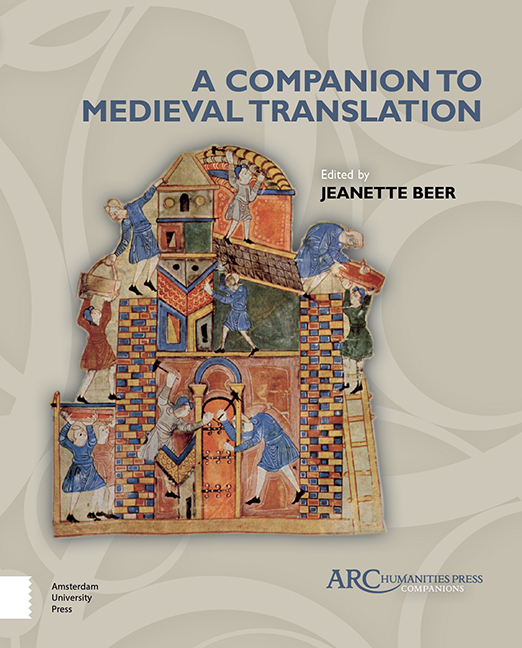Book contents
- Frontmatter
- Contents
- Acknowledgements
- Introduction
- Chapter 1 The European Psalms in Translation
- Chapter 2 The Old French Bible
- Chapter 3 Middle English Religious Translation
- Chapter 4 Bible Translation and Controversy in Late Medieval England
- Chapter 5 Medieval Convent Drama: Translating Scripture and Transforming the Liturgy
- Chapter 6 Translating Romance in Medieval Norway: Marie de France and Strengleikar
- Chapter 7 Christine de Pizan, Translator and Translation Critic
- Chapter 8 Translation, Authority, and the Valorization of the Vernacular
- Chapter 9 Vernacular Translation in Medieval Italy: volgarizzamento
- Chapter 10 Dante and Translation
- Chapter 11 Chaucer and Translation
- Chapter 12 Alchemy and Translation
- Chapter 13 Scientific Translation: A Modern Editor’s Perspectiv
- Chapter 14 Modern Theoretical Approaches to Medieval Translation
- Chapter 15 Observations on Translation by a Thirteenth-Century Maître: Li Fet des Romains
- Epilogue. Observations on Translation by the Oxford Professor of Poetry: Pearl
- General Bibliography
- Appendix
- Index
Chapter 13 - Scientific Translation: A Modern Editor’s Perspectiv
Published online by Cambridge University Press: 20 November 2020
- Frontmatter
- Contents
- Acknowledgements
- Introduction
- Chapter 1 The European Psalms in Translation
- Chapter 2 The Old French Bible
- Chapter 3 Middle English Religious Translation
- Chapter 4 Bible Translation and Controversy in Late Medieval England
- Chapter 5 Medieval Convent Drama: Translating Scripture and Transforming the Liturgy
- Chapter 6 Translating Romance in Medieval Norway: Marie de France and Strengleikar
- Chapter 7 Christine de Pizan, Translator and Translation Critic
- Chapter 8 Translation, Authority, and the Valorization of the Vernacular
- Chapter 9 Vernacular Translation in Medieval Italy: volgarizzamento
- Chapter 10 Dante and Translation
- Chapter 11 Chaucer and Translation
- Chapter 12 Alchemy and Translation
- Chapter 13 Scientific Translation: A Modern Editor’s Perspectiv
- Chapter 14 Modern Theoretical Approaches to Medieval Translation
- Chapter 15 Observations on Translation by a Thirteenth-Century Maître: Li Fet des Romains
- Epilogue. Observations on Translation by the Oxford Professor of Poetry: Pearl
- General Bibliography
- Appendix
- Index
Summary
Historically, the first great surge of scientific translation activity in medieval Europe came in the eleventh century with the reception of Arabic medicine following the Hellenization of Islam from the ninth century. It is a problematic phenomenon, embracing multiple languages, difficulties of defining and identifying authorship (i.e., distinguishing authors, collaborators, and scribes), a paucity of satisfactorily edited texts, and the methodological challenge of weighing scientific accuracy against textual authenticity, to say nothing of the uncertainties caused by variations of lexis and terminology.
Of the areas enriched by translations of scientific writings, the most substantial is medicine, which accounts for approximately one third of the translations. It is followed in importance by works dealing with astrology and astronomy, some of which are quite extensive. Then comes alchemy, the vernacular treatment of which has been seriously neglected. Treatises on divination are well represented and include a number of major works on geomancy. Pharmacology is covered by multiple translations of texts like the Antidotarium Nicolai and De simplicibus medicinis (“Circa instans”) where there is a complex Latin manuscript tradition. A handful of translations are devoted to subjects as diverse as uroscopy, physiognomy, ophthalmology, mathematics, hippiatry, geometry, chiromancy, meteorology and cometary phenomena, and botany. Treatises on falconry are more numerous than might be expected, and there are no fewer than six devoted to hippiatry (rendering a Latin source of ca. 1250 by Jordanus Rufus) including one by François du Tronchoy. Conversely, it is surprising that a text with such a rich manuscript tradition as the Regimen sanitatis Salernitanum (Flos medicinae) (184 manuscripts) seems to have inspired only one French translation, which is particularly difficult to date. These varied subjects may be found treated in Old/ Middle French, Occitan, Anglo-Norman, Spanish, and Catalan. Starting in the last quarter of the fourteenth century, translation into Middle English becomes prominent. The vast quantity of (pseudo-) scientific writing, above all medical works, may be easily gauged from the standard repertoire of George Keiser2 and Voigts and Kurtz. The medical materials have been the most intensively investigated. Most of these materials have not been edited and are resistant to simple identification as translations because they are generally anonymous and represent compilations. Their use in the Middle Ages continues to be a fruitful line of inquiry.
- Type
- Chapter
- Information
- Companion to Medieval Translation , pp. 153 - 164Publisher: Amsterdam University PressPrint publication year: 2019



